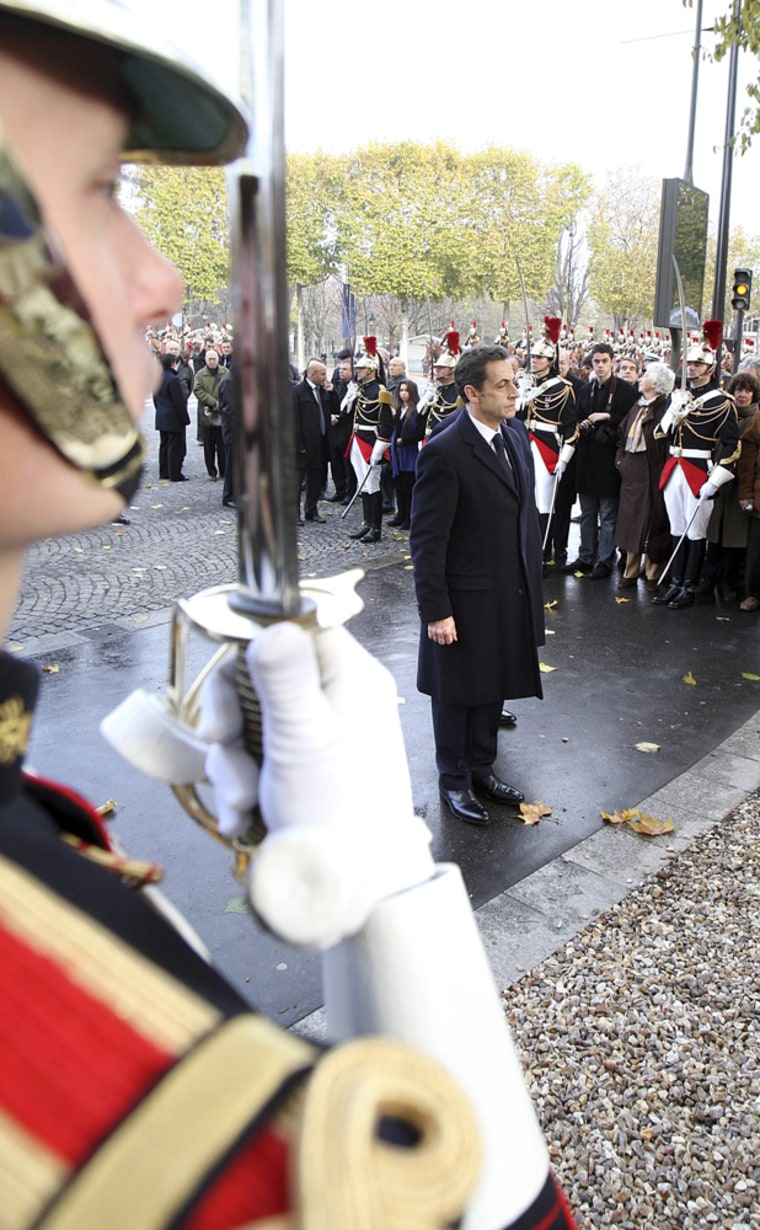For the first time since World War I, the leaders of Germany and France appeared together at a ceremony Wednesday to commemorate the end of the conflict, saying it is now time to celebrate their countries' reconciliation and friendship.
"French-German friendship is sealed with blood," French President Nicolas Sarkozy said under the shadow of the Arc de Triomphe, site of the Tomb of the Unknown Soldier.
Sarkozy and German Chancellor Angela Merkel together laid a wreath of flowers at the tomb and symbolically relit the perpetual flame above it to mark the 91st anniversary of the end of World War I.
"This small flame is also ... the flame of hope," Sarkozy said.
The bold departure from traditional Armistice Day commemorations came two days after Sarkozy traveled to Germany to help celebrate the 20th anniversary of the fall of the Berlin Wall.
"One must learn to rise above one's history," Merkel said in a speech. "What happened cannot be forgotten, but there is a force that can help us ... the force of reconciliation."
Tens of millions of civilians and soldiers were killed during what was labeled the Great War between Germany and allied nations France, Britain and its former colonies, including the United States, Australia and Canada.
Other nations that were hard hit by World War I, notably Britain and Belgium, also were marking Armistice Day. Services were also held in cities across Australia, and Veterans Day events were held in the United States.
Two minutes of silence
Britain held its first Armistice Day service at Westminster Abbey since the deaths of Britain's last World War I veterans — Henry Allingham, Harry Patch and William Stone. The service recognized the contributions of both the armed forces and civilians.
People across the country paused for the traditional two minutes of silence at 11 a.m. — as did the Bank of England, which interrupted its news conference on its quarterly economic update, an event closely watched by financial markets.
At 11 a.m. on Nov. 11, 1918 — the 11th hour of the 11th day of the 11th month — an armistice ended fighting on the Western Front, signed by the Allies and Germany in a railroad car outside Compiegne, north of Paris.
Britain's Queen Elizabeth II laid a wreath of poppies on the Grave of the Unknown Warrior in London's Westminster Abbey, where a service commemorating the war dead was held.
"We remember, with grief, the gas and the mud, the barbed wire, the bombardment, the terror ... and with gratitude, the courage and sacrifice," John Hall, the Dean of Westminster, said while opening the service.
Poppy petals
In Belgium, eight fire brigade buglers led a solemn last post ceremony at the world-famous Menen Gate war memorial to remember the millions of soldiers and civilians who died in World War I.
Poppy petals fell from the arched memorial to commemorate the deaths after dignitaries and lawmakers from Belgium, Britain, Canada, New Zealand, Australia and India paused for two minutes' silence.
The Menen Gate has the names of 55,000 missing soldiers engraved on its limestone walls. A further 35,000 names of the missing are listed at the Tyne Cot military cemetery, which contains 12,000 graves — making it the largest Commonwealth military burial site in the world.
Tens of thousands of people lined the narrow streets of Ieper, better known to soldiers by its French name, Ypres, a town that was left in ruins during the 1914-1918 war and became a world symbol of peace.
Tens of millions of civilians and soldiers were killed during what was labeled the Great War between Germany and allied nations France, Britain and its former colonies including Australia and Canada.
Belgium's Flanders region saw some of the fiercest and bloodiest trench warfare on the Western Front during the war.
Some 150 war cemeteries dot Flanders Fields and experts believe 100,000 soldiers still remain unaccounted for almost a century after the end of one of the bloodiest wars ever fought in Europe.
‘For us ... a day of peace’
The last of 8.4 million French who fought in the war that tore Europe apart died in March 2008, and Sarkozy wanted to use the Armistice commemoration to look to the future with the nation that was vanquished but which, with France, now has a central role in the European Union.
"For us, Nov. 11 is a day of peace in Europe and the fall of the wall is a day of freedom," said Merkel, who herself escaped from East Germany to the West after the collapse of the wall that defined the Cold War.
With evident emotion, Sarkozy and Merkel listened as the French Army Choir sang the French and German national anthems. Together, they reviewed troops posted around the Arc de Triomph at the top of the Champs-Elysees Avenue. Some 2,000 French and German youths were taking part in day-long ceremonies.
